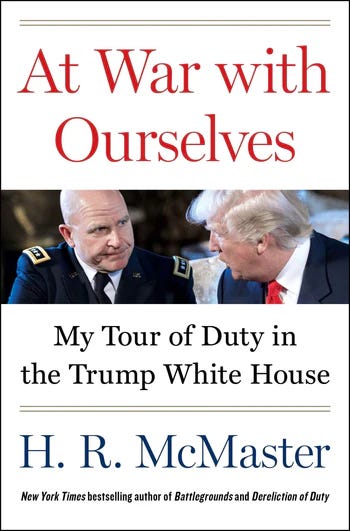Inside the Trump White House: A battle of wits and will
H.R. McMaster’s candid account of leadership, loyalty, and dysfunction during President Trump's first term in office
At War with Ourselves: My Tour of Duty in the Trump White House
By H.R. McMaster
Grade: 96
“It’s right there in the title.”
That’s what I kept saying while reading At War with Ourselves and learning of how the former president’s leadership style created a veritable circular firing squad inside the White House, where members of the inner circle were incentivized to malign, undermine, and disrupt one another nonstop.
It did, however, make for interesting reading.
When it comes to books about the Trump White House, it’s easy to assume that if you’ve read one, you’ve read them all. Chaos. Infighting. Twitter storms. Rinse, repeat. But every now and then, a book comes along that challenges that assumption.
At War with Ourselves is such a book. I’ve read my fair share of political memoirs—probably too many—but this one stands out for its depth, detail, and thoughtful analysis. I was constantly reminded that McMaster is not just a former National Security Advisor but also an esteemed historian.
Surprisingly, given that McMaster was unceremoniously fired by President Trump, this book is not a tell-all or a hit job. It’s thoughtful, measured, and refreshingly honest. McMaster doesn’t sugarcoat his time in the administration; nor does he take cheap shots. Instead, he delivers something increasingly rare in political discourse: nuance.
What Trump got right
Two things stood out to me as I read the book:
McMaster genuinely enjoyed his job and took serving the president—and the country—seriously.
The conflicts with Defense Secretary James Mattis and Secretary of State Rex Tillerson felt petty, unnecessary and frustrating.
McMaster offers a fair evaluation of Trump’s foreign policy, acknowledging where he believes the president got things right. For example, he commends Trump’s push for NATO allies to increase defense spending, describing it as “a step in the right direction.”
On the subject of the Iran nuclear deal, formally known as the Joint Comprehensive Plan of Action (JCPOA), McMaster supported reimposing sanctions, contrasting Trump’s approach with President Obama’s. He argues that Trump’s decision was strategically sound, if controversial.
Trump and Putin: A puzzle
Trump’s deference to Russian President Vladimir Putin remains one of the great puzzles of his presidency, and McMaster, at several points in the book, alludes to it. He offers a few plausible theories, suggesting it might stem from Trump’s admiration for strongmen or a transactional mindset focused on personal or political gain.
While he refrains from joining the speculative frenzy surrounding Trump and Putin’s bromance, he acknowledges that there’s something there.
White House backbiting
The dysfunction of the Trump White House is a recurring theme, but McMaster approaches it with restraint. While he avoids placing blame on any individual, his words reveal a longing for professionalism and normalcy.
The constant infighting among staff didn’t just complicate his job—it made success nearly impossible. He, on numerous occasions, brings up Trump’s penchant for pitting people against one another, creating a toxic environment that undermines teamwork and strategic decision-making.
Perhaps the most disheartening parts of the book involve McMaster’s clashes with Mattis, Tillerson, and, later, Chief of Staff John Kelly. He portrays these conflicts as a mix of ideological differences and petty office politics—more befitting The Office than the White House. (In fairness, Gen. Mattis has described McMaster as being far from pleasant to work with.)
Finally
At War with Ourselves is a masterclass in leadership, strategy, and resilience under nearly impossible conditions.
Time and again, I found myself thinking, “I cannot imagine working in such an environment without wishing to be fired.”
What impressed me most was McMaster’s refusal to make the book about settling scores. Yes, was candid about the challenges of working with Mattis, Tillerson, Kelly, and even Trump, but he kept the focus on the job and the larger lessons of public service.
I was impressed.




